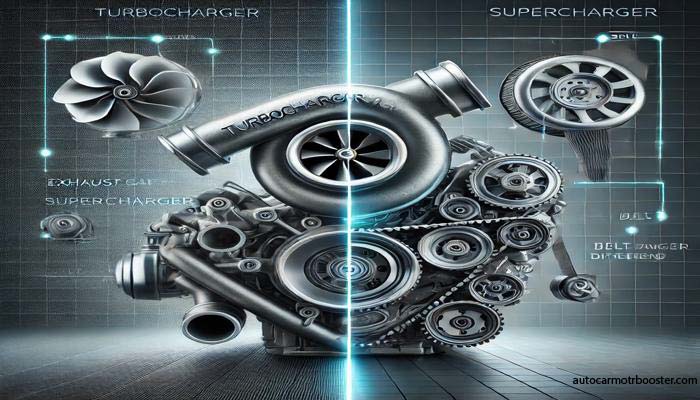
When it comes to boosting engine performance, two main contenders always pop up—Turbochargers and Superchargers. Both have their advantages and drawbacks, but which one is the better choice for your vehicle? In this article, we’ll dive deep into the key differences between a Turbo and a Supercharger, helping you make an informed decision.
What is a Turbocharger?
A turbocharger, often called a turbo, is a device that forces more air into the engine’s cylinders, leading to more power. It uses the energy from the exhaust gases, which would otherwise be wasted, to spin a turbine that compresses air back into the engine. Turbochargers are known for their efficiency and ability to extract more power from smaller engines. They work best at higher RPMs, making them popular in performance cars.
What is a Supercharger?
A supercharger, on the other hand, also compresses air and forces it into the engine, but it is powered by a belt connected directly to the engine. This makes a supercharger more responsive because it doesn’t rely on exhaust gases, providing instant power. However, this direct connection to the engine means that superchargers take some power from the engine to function, leading to a slight loss in overall efficiency.
Advantages of Turbochargers
- Efficiency: One of the primary benefits of a turbocharger is fuel efficiency. Since it uses exhaust gases to spin the turbine, it’s not consuming any extra power from the engine.
- Smaller Engine, More Power: Turbochargers allow smaller engines to produce more power. This has led to the growing trend of downsized engines in many modern cars.
- Less Heat Generation: Turbochargers tend to generate less heat compared to superchargers, reducing stress on the engine components.
Advantages of Superchargers
- Instant Power: One of the biggest advantages of a supercharger is its immediate throttle response. There is no lag like in turbochargers. As soon as you press the gas, the power is there.
- Simpler Installation: Since superchargers don’t rely on exhaust gases, their installation is often simpler and less intrusive to the engine system.
- Increased Torque: Superchargers often provide more low-end torque, which is useful for vehicles that need immediate power, like trucks and SUVs.
Turbocharger vs. Supercharger: Performance Comparison
When comparing the two, it’s crucial to understand how each performs in different conditions:
- Turbochargers are generally more efficient, but they suffer from what is called turbo lag, a delay between when you press the gas pedal and when the turbo kicks in. This can make turbos feel less responsive at low RPMs.
- Superchargers, on the other hand, deliver power instantly, but they require more power from the engine to operate. This can reduce the overall efficiency of the engine, particularly in terms of fuel consumption.
Which One Is Right for You?
The choice between a turbocharger and a supercharger depends largely on your driving needs:
- If you want better fuel efficiency and are okay with a slight delay in power, then a turbocharger is probably the better option.
- If you need instant power for off-the-line acceleration, and fuel consumption is less of a concern, a supercharger could be the better choice.
Maintenance and Durability
Both turbochargers and superchargers require regular maintenance, but superchargers tend to be more durable over time since they are mechanically simpler. Turbochargers can be more sensitive to oil changes and may need more frequent maintenance due to their reliance on exhaust gases.
Environmental Impact
Turbochargers are often seen as the greener option, as they help improve fuel economy by using smaller engines to generate more power. Superchargers don’t offer the same level of fuel efficiency, making turbos a more eco-friendly option.
FAQs
1. What is the biggest difference between a turbocharger and a supercharger? The main difference is how they are powered. A turbocharger uses exhaust gases, while a supercharger is directly driven by the engine.
2. Which is more fuel-efficient, a turbocharger or a supercharger? A turbocharger is typically more fuel-efficient because it doesn’t take power directly from the engine to operate.
3. Does a supercharger provide better performance than a turbocharger? It depends on what you’re looking for. A supercharger provides instant power, while a turbocharger is more efficient but may have a slight delay.
4. Can you install both a turbocharger and a supercharger on the same engine? Yes, it’s possible to install both, and it’s called twincharging. However, this setup is complex and expensive.
5. Which is better for everyday driving, a turbocharger or a supercharger? For everyday driving, a turbocharger is generally better due to its efficiency and ability to provide power when needed without sacrificing fuel economy.
If Like This Article Visit Our Website. Collect From Wekiapedia